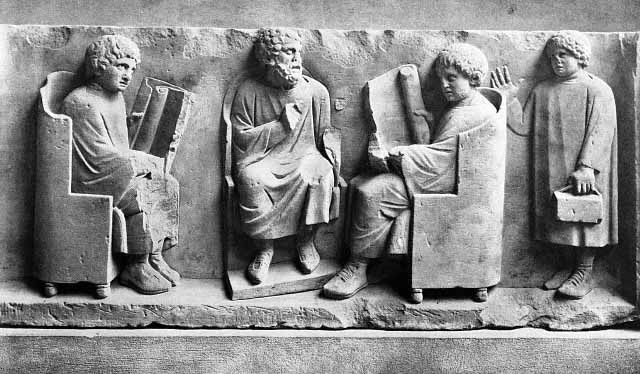

Social class in ancient Rome was hierarchical, but there were multiple and overlapping social hierarchies, and an individual's relative position in one might be higher or lower than in another. The status of freeborn Romans during the Republic was established by:
census rank (ordo) based on wealth and political privilege, with the senatorial and equestrian ranks elevated above the ordinary citizen;
attainment of honors (the novus homo or self-made man established his family as nobilis, "noble", and thus there were noble plebeians); and
citizenship, of which there were grades with varying rights and privileges. Men who lived in towns outside Rome (such as municipia or colonies) might hold citizenship, but lack the right to vote (see ius Latinum); free-born Roman women were citizens, but could not vote or hold political office.
Roman society was patriarchal in the purest sense; the male head of household (paterfamilias) held special legal powers and privileges that gave him jurisdiction (patria potestas) over all the members of his familia, a more encompassing term than its modern derivative "family" that included adult sons, his wife (but only in Rome's earlier history, when marriage cum manu was practiced), married daughters (in the Classical period of Roman history), and various relatives as well as slaves.
The patron-client relationship (clientela), with the word patronus deriving from pater, "father", was another way in which Roman society was organized into hierarchical groups, though clientela also functioned as a system of overlapping social networks. A patron could be the client of a socially superior or more powerful patron; a client could have multiple patrons.
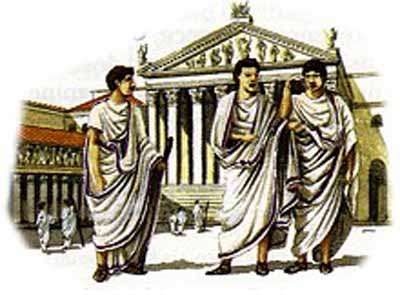
The broadest division was between the patricians, whose ancestry, shrouded in mythical origins, was traced to the first Senate established by Romulus, and the plebs, all other citizens.
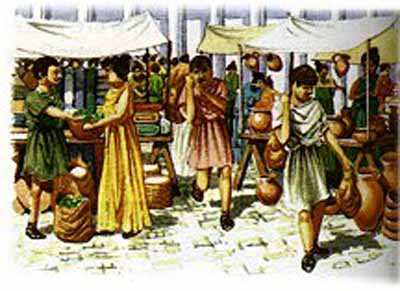
Originally, all public offices were open only to patricians, and the classes could not intermarry. A series of social struggles saw the plebs secede from the city on three occasions, the last in 297 BC, until their demands were met. They won the right to stand for office, the abolition of the intermarriage law, and the creation of office of tribune of the plebs.
This office, founded in 494 BC as a result of a plebeian secession, was the main legal bulwark against the powers of the patrician class, and only plebeians were eligible. The tribunes originally had the power to protect any plebeian from a patrician magistrate.
Later revolts forced the Senate to grant the tribunes additional powers, such as the right to veto legislation. A tribune's person was sacrosanct, and he was obliged to keep an open house at all times while in office. Some patricians, notably Clodius Pulcher in the late 60s BC, petitioned to be assigned plebeian status, in order to accumulate the political influence among the people that the office of tribune afforded.
The conflict between the classes came to a climax in 287 BC when patricians and plebeians were declared equal under the law.
Following these changes the distinction between patrician and plebeian status became less important, and by the Late Republic the only patrician prerogatives were a few priesthoods.
Over time, some patrician families declined, some plebeian families rose in status, and the composition of the ruling class changed. A plebeian who was the first of his line to become consul was known as a novus homo ("new man"), and he and his descendants became "noble" (nobiles). Notable examples of novi homines are the seven-time consul Marius, and Cicero, whose rise was unusual in that it was driven by his oratorical and intellectual abilities rather than, as with Marius, military success. During the Empire, patricius became a title of nobility bestowed by emperors.
The census divided citizens into six complex classes based on property. The richest were the senatorial class, who were worth at least 1,000,000 sestertii. The wealth of the senatorial class was based on ownership of large agricultural estates, and by custom members did not engage in commercial activity.
Below the senatores in rank, but above were the equites ("equestrians" or "knights"), with 400,000 sestertii, who could engage in commerce and formed an influential business class. Certain political and quasi-political positions were filled by equites, including tax farming and, under the Principate, leadership of the Praetorian Guard. Below the equites were three more classes of property-owning citizens; and lastly the proletarii, whose property was valued below 11,000 asses.
Citizenship in ancient Rome was a privileged political and legal status afforded to freeborn individuals with respect to laws, property, and governance.
The Latin Right was a form of citizenship with limited rights. It was conferred originally on the allied towns of Latium in the Republica era, and gradually extended to communities throughout the Empire. Latin citizens had rights, but not the vote, although their leading magistrates could become full citizens.
Freedmen (libertini) were freed slaves, whose free-born children were full citizens. The status of libertini developed throughout the Republic as their number increased. Livy states[citation needed] that freedmen in the Early Republic mainly joined the lower classes of the plebeians. Juvenal, writing during the Empire when financial considerations dictated economic class, describes freedmen who had been accepted into the equestrian class.
Freedmen were often highly educated and made up the bulk of the civil service during the early Empire. The Augustan poet Horace was himself the child of a freedman from Venusia in southern Italy. Many became enormously wealthy as the result of bribes, fraud, or other forms of corruption, or were gifted large estates by the Emperor they served.
Other freedmen engaged in commerce, amassing vast fortunes often only rivaled by those of the wealthiest nobiles. Many of the Satires of Juvenal contain angry denouncements of the pretensions of wealthy freedmen, some 'with the chalk of the slave market still on their heel'. Juvenal saw these successful men as nouveaux riches who were far too ready to show off their (often ill-gotten) wealth. The majority of freedmen, however, joined the plebeian classes, and often worked as farmers or tradesman.
Free-born foreign subjects were known as Peregrini, and special laws existed to govern their conduct and disputes. These distinctions continued until AD 212, when Caracalla extended full Roman citizenship to all free-born men in the empire.
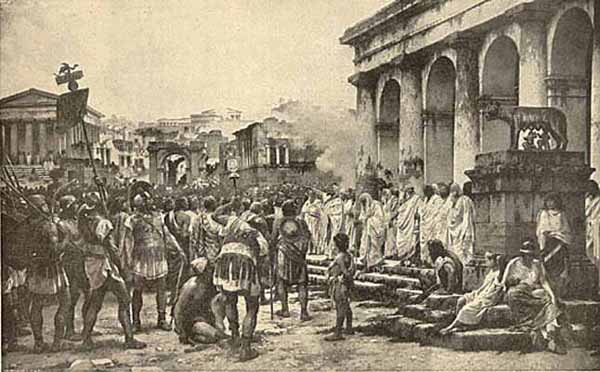
Slavery
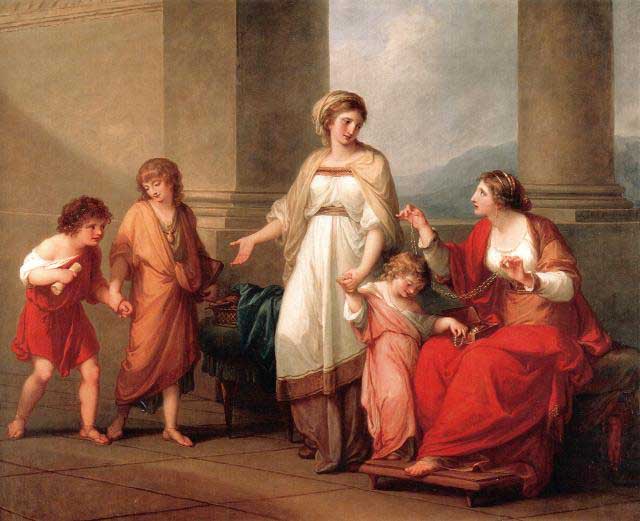
Women